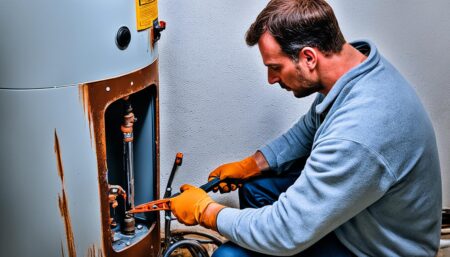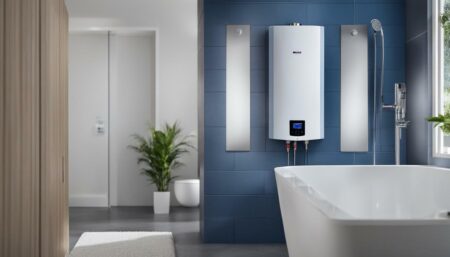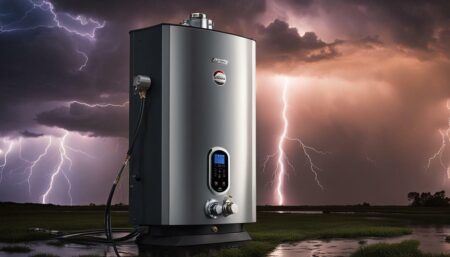If you’re looking for a cost-effective and efficient solution for hot water supply, specifically for a single shower, a tankless water heater might be the best option. Unlike traditional water heaters, tankless water heaters heat water directly without needing a storage tank, providing a constant flow of hot water on demand.
Choosing the best tankless water heater for single shower use is crucial to ensure you get the most out of your investment. With so many options available in the market, it can be overwhelming to make a decision. That’s why it’s important to understand the benefits and key factors before purchasing.
- A tankless water heater is a cost-effective and efficient solution for hot water supply in a single shower setup.
- Choosing the best option requires understanding the benefits and key factors to consider.
- With an on-demand hot water supply, a tankless water heater can help save energy and reduce utility bills.
- When budgeting for a tankless water heater, installation, and maintenance costs should also be considered.
- Researching and comparing top-rated brands and models can help you decide based on your needs and preferences.
Understanding Tankless Water Heaters
Before delving into the specifics of a tankless water heater for single shower use, it is important to understand how tankless water heaters work. Unlike traditional water heaters that store and continuously heat a large volume of water, tankless water heaters heat water on demand as it flows through the unit.
There are two types of tankless water heaters: electric and gas. Electric tankless water heaters use heating elements to heat the water, while gas tankless water heaters use a burner to heat the water as it passes through the unit.
The installation process for a tankless water heater can vary depending on the unit type and the home’s specific setup. Electric units typically require less space and can be installed closer to the point of use, while gas units require proper ventilation and a larger installation space.
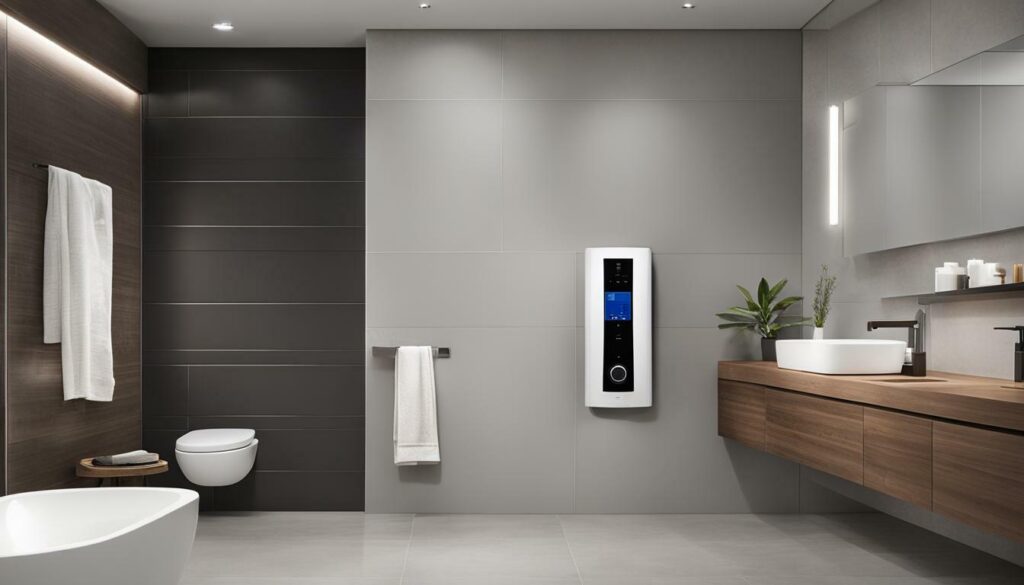
Regardless of the type, a tankless water heater can provide a continuous supply of hot water while also being more energy efficient than a traditional water heater. In the next section, we will explore the benefits of using a tankless water heater specifically designed for single shower use.
Benefits of a Tankless Water Heater for Single Shower Use
Switching to a tankless water heater for single shower use comes with a host of benefits. Not only are these units energy-efficient, but they are also compact and provide instant hot water whenever you need it.
The biggest advantage of a tankless water heater is the energy savings. Traditional water heaters constantly store and heat water, which results in unnecessary energy consumption. A tankless water heater heats water on demand, reducing standby energy loss and ultimately lowering your energy bills.
Another benefit of a tankless water heater for single shower use is its compact size. Unlike traditional water heaters, which take up valuable floor space, tankless water heaters can be mounted on a wall, freeing up space in your bathroom.
Furthermore, tankless water heaters provide instant hot water whenever you need it. With a traditional water heater, you may have to wait several minutes for the hot water to reach your shower. A tankless water heater eliminates this wait time, providing you with hot water as soon as you turn on the shower.
In summary, a tankless water heater for single shower use is an energy-efficient, compact, and convenient option for your hot water needs. By switching to a tankless unit, you can save money on energy bills, free up space in your bathroom, and enjoy instant hot water whenever you want.
When it comes to choosing a tankless water heater for single shower use, selecting the appropriate capacity is crucial. The size of the unit will determine how much hot water it can supply on demand and whether it can keep up with your household’s requirements. A unit that is too small will struggle to supply hot water consistently, while one that is too large may consume more energy than necessary.
So, how do you determine the right capacity for your needs? The general rule of thumb is that a tankless water heater for a single shower use should have a minimum flow rate of 2-2.5 gallons per minute (GPM). This should be enough to provide a steady stream of hot water throughout your shower.
However, other factors may also impact your decision, such as the temperature rise needed to achieve your desired hot water temperature and the number of fixtures in your household. A professional plumber can help guide you through the selection process and recommend a suitable capacity based on your specific requirements.
Factors to Consider in Selecting the Right Capacity
| Factor | Consideration |
|---|---|
| Number of household members | A larger household will require a higher capacity unit. |
| Usage patterns | How often and for how long you use hot water in your household will impact your capacity needs. |
| Temperature rise | The difference between your cold water temperature and the desired hot water temperature will affect the required capacity. |
| Fixture count | The more fixtures you have in your household, the higher the capacity needed. |
By considering these factors and working with a professional, you can ensure that you select a tankless water heater with the right capacity for your single shower needs.
When selecting a tankless water heater for single shower use, it’s important to consider several factors to ensure you choose the best option. Here are some of the key factors to keep in mind:
- Size and Capacity: The size and capacity of the tankless water heater should be appropriate for your single shower needs. A unit that is too small will struggle to provide sufficient hot water, while a unit that is too large will waste energy and increase costs.
- Energy Efficiency: Look for a tankless water heater that is energy efficient, as this will help you save money on your monthly utility bills. Models with an ENERGY STAR rating are particularly efficient.
- Type: Consider whether an electric or gas tankless water heater is more suitable for your needs. Electric models are typically more affordable and easier to install, while gas models are more energy efficient and have a longer lifespan.
- Flow Rate: The flow rate of a tankless water heater is the amount of hot water it can produce at once. For single shower use, a flow rate of 2-3 gallons per minute should be sufficient.
- Brand and Model: Look for reputable brands and models that have received positive customer reviews. This will ensure you choose a reliable and high-performing tankless water heater.
By considering these factors, you can narrow down your options and select the best tankless water heater for your single shower needs. Remember to do your research and compare different models to find the one that suits your budget and preferences.
Installing a tankless water heater for single shower use is a fairly straightforward process for a seasoned DIYer or a licensed professional. However, proper installation is paramount for optimal performance and safety. Here are some tips to keep in mind:
- Choose the right location: Before installing the unit, select an appropriate location that has adequate ventilation, access to a gas or electrical power supply, and sufficient clearance for maintenance and repairs. Make sure the location is within close proximity to the shower to avoid long wait times for hot water.
- Size it up: Determine the right-sized unit based on the shower’s flow rate and desired temperature rise. Oversized units can lead to energy waste, while undersized units can result in insufficient hot water output for the shower.
- Clear the pipes: Flush out any sediment or debris from the water lines before connecting the unit to avoid damage to the internal components.
- Check the gas line: If installing a gas tankless water heater, ensure that the gas line is properly sized for the unit’s BTU rating and that there are no leaks in the connection.
- Don’t forget the venting: Gas units require proper venting to the outside to prevent the buildup of toxic gases and ensure safe operation. Make sure to follow the manufacturer’s guidelines for appropriate venting.
- Set the temperature: Adjust the temperature setting to the desired level once the unit is connected and powered on. Most units have a display screen or controller for easy access.
While these tips provide a general overview of the installation process, it is crucial to follow the manufacturer’s instructions and consult a professional if unsure. Improper installation can lead to safety hazards, equipment damage, and efficiency issues.
One of the key advantages of a tankless water heater is its energy efficiency, and proper maintenance is crucial to ensure optimal performance and longevity while keeping energy bills low. Here are some maintenance and care tips to keep in mind:
- Read the manual: Always refer to the manufacturer’s manual for specific maintenance instructions and safety guidelines.
- Flush the system: Over time, mineral build-up can occur in the heat exchanger, reducing the efficiency of the unit. To prevent this, flush the system at least once a year with a descaling solution.
- Check the filter: Most tankless water heaters have a filter that traps debris, preventing it from entering the system and causing damage. Check the filter regularly and clean or replace as needed.
- Inspect the unit: Regularly inspect the unit for signs of corrosion, leaks, or damage. Address any issues promptly to prevent further damage.
- Schedule professional maintenance: Consider scheduling annual maintenance with a qualified technician to ensure the unit is functioning properly and identify any potential issues before they become major problems.
By following these maintenance and care tips, you can enjoy the full benefits of an energy-efficient water heater while prolonging its lifespan and avoiding costly repairs.
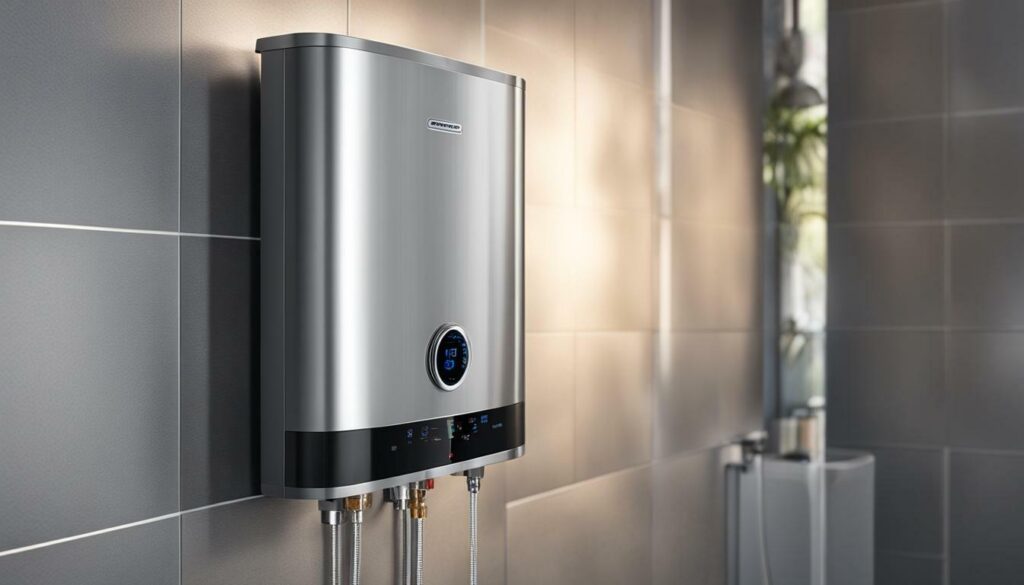
When it comes to hot water supply, traditional water heaters have been the go-to option for years. However, tankless water heaters are becoming increasingly popular due to their energy efficiency and convenience. Let’s compare the two to help you make an informed decision.
Efficiency
One of the most significant differences between tankless and traditional water heaters is energy efficiency. Tankless water heaters only heat water on demand, meaning they do not have to constantly maintain hot water in a tank. This results in significant energy savings and lower monthly bills. Traditional water heaters, on the other hand, have to maintain a constant temperature in their tank, even when not in use, leading to wasted energy and higher costs.
Cost-Effectiveness
While tankless water heaters may have a higher upfront cost than traditional ones, they can be more cost-effective in the long run. Because of their energy efficiency, they require less maintenance and have a longer lifespan, reducing the need for replacements and repairs in the future. Traditional water heaters typically have a shorter lifespan and require more maintenance, resulting in higher costs over time.
Overall Performance
Tankless water heaters provide hot water on demand, meaning there is no need to wait for the water to heat up. They are also compact in size, making them a suitable option for those with limited space. In contrast, traditional water heaters take time to heat up, and their large size takes up valuable space in a home or apartment.
Overall, tankless water heaters are a more energy-efficient and cost-effective option for single shower use. They may have a higher initial cost, but they provide a better return on investment in the long run. Consider switching to a tankless water heater for your hot water needs.
There are several brands and models of tankless water heaters available in the market today. However, not all of them are suitable for single-shower use. To make your decision process easier, we have compiled a list of some of the best tankless water heaters for single shower use.
| Brand and Model | Features | Price Range |
|---|---|---|
| ECOTOUCH Electric Tankless Water Heater | Advanced self-modulation technology adjusts power usage based on hot water demand, digital temperature display, compact design | $139-$169 |
| Rheem RTEX-04 Tankless Water Heater | External temperature control, rugged brass/copper heat exchanger, on-unit temperature display, compact size | $150-$200 |
| Takagi T-KJr2-IN-NG Indoor Tankless Water Heater | Natural gas fuel, Energy Star certified, constant temperature monitoring, compact size, easy installation | $500-$600 |
| Stiebel Eltron Tempra Plus 24 kW Tankless Water Heater | Digital temperature control, flow control for stable water temperature, quiet operation, compact size, German engineering | $650-$750 |
ECOTOUCH Electric Tankless Water Heater is a popular choice among homeowners due to its efficiency and ease of use. This unit is Energy Star certified and has a digital temperature display, making it easy to set your desired water temperature. Additionally, its compact size makes it perfect for small spaces.
Rheem RTEX-04 Tankless Water Heater is another great option for single shower use. This unit is known for its external temperature control, which allows you to adjust the water temperature easily. It also has a rugged brass/copper heat exchanger for durability and reliability.
Takagi T-KJr2-IN-NG Indoor Tankless Water Heater is a natural gas option that is Energy Star certified and produces constant hot water without fluctuations in temperature. It is also compact and easy to install.
Stiebel Eltron Tempra Plus 24 kW Tankless Water Heater is a premium option for those who value high-quality, German engineering. This unit has digital temperature control and flow control for stable water temperature. It is also quiet during operation and has a compact size, making it perfect for small spaces.
When choosing the best tankless water heater for your single shower needs, it is important to consider your budget, installation requirements, and hot water usage habits. By selecting one of the top brands and models highlighted above, you can ensure that you are making an informed decision and investing in a high-quality product that will meet your needs for years to come.
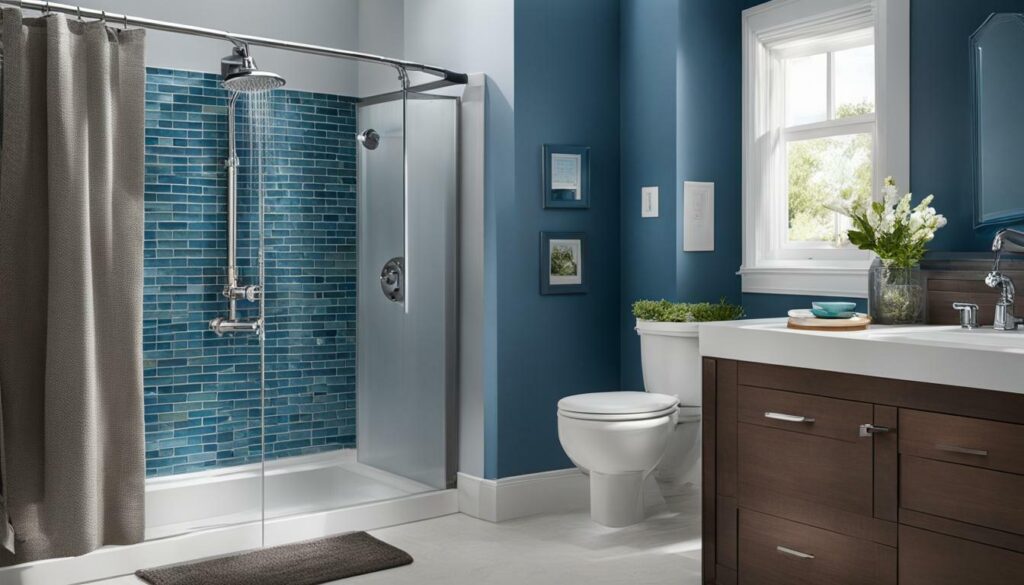
When it comes to tankless water heater installation, costs will vary depending on factors such as the type of unit, complexity of installation, and location. On average, installation costs can range from $1,500 to $3,500. It’s important to hire a professional installer who has experience with tankless water heaters to ensure proper installation.
Additionally, maintenance costs should also be considered. While tankless water heaters generally require less maintenance than traditional units, they still need annual maintenance to ensure optimal performance. The cost of maintenance can range from $100 to $200 per year, depending on the model and any necessary repairs.
It’s crucial to factor in both installation and maintenance costs when budgeting for a tankless water heater for single shower use. Keep in mind that while the initial cost may be higher than traditional units, the long-term energy savings and efficiency of a tankless option can ultimately offset these costs over time.
Tips for Efficient Use of Tankless Water Heaters:
Switching to a tankless water heater can bring significant energy savings and environmental benefits. Here are some tips to make the most of your energy-efficient water heater:
- Limit hot water usage: Since tankless water heaters only provide hot water on-demand, it is important to be mindful of the amount of hot water used at a time. Consider shortening your showers or using a low-flow showerhead to reduce hot water consumption.
- Use a timer: Installing a timer can help conserve energy by scheduling the water heater to only turn on when hot water is needed. This ensures that the heater is not running unnecessarily.
- Regular maintenance: Proper maintenance can ensure that your tankless water heater is running efficiently and at optimal performance. Schedule regular check-ups with a professional to keep your unit in top shape.
- Insulate pipes: Insulating the pipes that transport hot water can reduce heat loss and improves energy efficiency. This can help to further reduce the energy consumption of your tankless water heater.
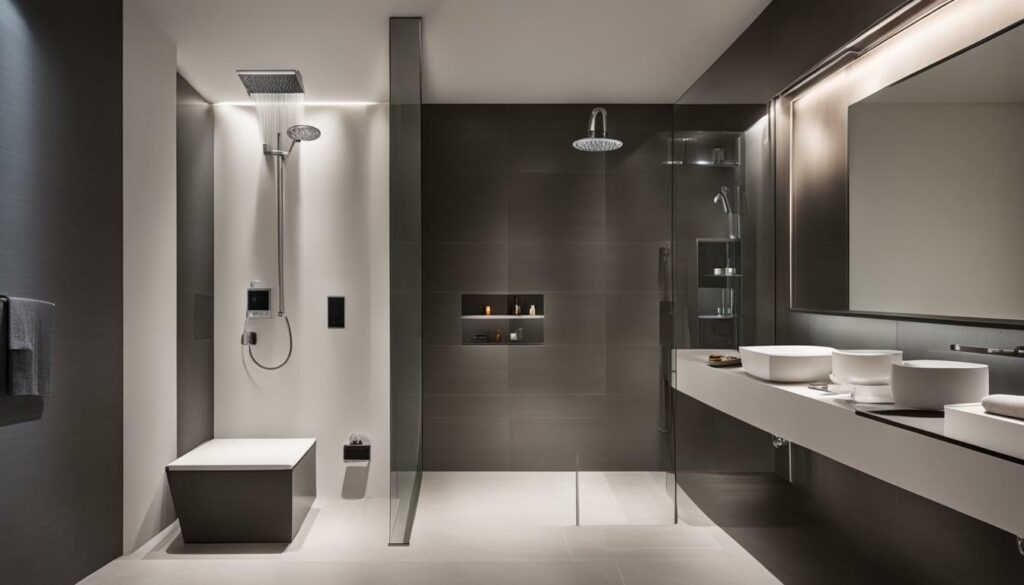
Remember: Energy-efficient water heaters can provide you with substantial savings while also reducing your carbon footprint. By adopting these tips, you can make the most of your tankless water heater for single shower use while reducing your environmental impact.
Conclusion
Choosing a tankless water heater for single shower use can be a smart and cost-effective decision. These units offer instant hot water and are incredibly energy-efficient, helping you save money on your energy bills in the long run.
When selecting a tankless water heater, pay attention to the unit’s capacity to ensure it meets your needs. Look for models from reputable brands that offer key features such as compact size, easy installation, and low maintenance.
Tips for Efficient Use of Tankless Water Heaters
Once you’ve installed your tankless water heater, it’s important to use it efficiently to maximize its benefits. To do so, try to limit shower times and avoid running hot water unnecessarily. Consider using low-flow showerheads and faucets to reduce water consumption and increase efficiency. Additionally, scheduling regular maintenance checks and cleaning is crucial to keep your unit running smoothly.
Installation and maintenance costs should also be taken into account when budgeting for a tankless water heater. While the initial investment may be higher than a traditional water heater, the long-term savings and benefits are well worth it.
Overall, a tankless water heater for single shower use can be an excellent addition to your home. By choosing the best unit for your needs and using it efficiently, you’ll enjoy endless hot water and lower energy bills for years to come.




